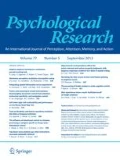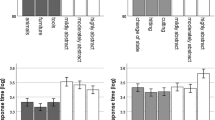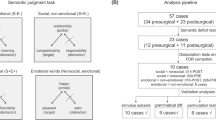Abstract
Abstract words have usually been treated as a homogenous group, with limited investigation of the influence of different underlying representational systems for these words. In the present study we examined lexical–semantic processing of abstract verbs, separating them into mental state, emotional state and nonembodied state types. We used a syntactic classification task and a memory task to investigate behavioural differences amongst the abstract verb types. Semantic richness effects of each of the verbs' associates were then investigated to determine the relationship of linguistic associations to semantic processing response times for abstract verbs. We found a modest effect of abstract verb type, with mental state abstract verbs processed more quickly than nonembodied abstract verbs in the syntactic classification task; however, this effect was task dependent. We also found that memory was less accurate for the mental state abstract verbs. The semantic richness analysis of abstract verb associates revealed (1) that the concreteness of an abstract verb’s associates has a positive relationship to the verb’s response time and (2) a negative relationship between response time and age of acquisition for associates of nonembodied verbs. The results provide support for the proposal that abstract concepts engage complex representations in modal and linguistic systems.


Similar content being viewed by others
Notes
The response time data from Experiments 1–3 exhibited a positive skew. Supplementary analyses using a log-transformed response time for all mixed effect models reported here found that all significant fixed effects remained when using the log-transformed response time, with the exception of the significant difference between nonembodied abstract verbs and embodied verbs reported for Experiment 2. This effect was also not present in Experiment 1, which likely indicates this is not a strong or reliable effect as discussed in the discussion section.
Mixed effect models were also conducted using the response data for the Experiment 2 encoding task and the SCT from Experiment 3. Those results are consistent with the AoA and concreteness effects reported here. The frequency of associates effect from Experiment 1 was not replicated in the data from Experiment 2 or 3.
References
Altarriba, J., & Bauer, L. M. (2004). The distinctiveness of emotion concepts: A comparison between emotion, abstract and concrete words. The American Journal of Psychology, 117(3), 389–410.
Aziz-Zadeh, L., Wilson, S. M., Rizzolatti, G., & Iacoboni, M. (2006). Congruent embodied representations for visually presented actions and linguistic phrases describing actions. Current Biology, 16(18), 1818–1823. https://doi.org/10.1016/j.cub.2006.07.060.
Barsalou, L. W. (1987). The instability of graded structure in concepts. In U. Neisser (Ed.), Concepts and conceptual development: Ecological and intellectual factors in categorization (pp. 101–140). New York: Cambridge University Press.
Barsalou, L. W. (2008). Grounded cognition. Annual Review of Psychology, 59, 617–645. https://doi.org/10.1146/annurev.psych.59.103006.093639.
Barsalou, L. W. (2016). On staying grounded and avoiding quixotic dead ends. Psychonomic Bulletin and Review, 23(4), 1122–1142. https://doi.org/10.3758/s13423-016-1028-3.
Barsalou, L. W., Santos, A., Simmons, W. K., & Wilson, C. D. (2008). Language and simulation in conceptual processing. In M. De Vega, A. M. Glenberg, & A. C. Graesser (Eds.), Symbols, embodiment, and meaning (pp. 245–283). Oxford: Oxford University Press.
Barsalou, L. W., & Weimer-Hastings, K. (2005). Situating abstract concepts. In D. Pecher & R. Zwaan (Eds.), Grounding cognition: The role of perception and action in memory (pp. 129–163). New York: Cambridge University Press.
Bates, D., Mächler, M., Bolker, B., & Walker, S. (2015). Fitting linear mixed-effects models Usinglme4. Journal of Statistical Software. https://doi.org/10.18637/jss.v067.i01.
Bennett, S. D., Burnett, A. N., Siakaluk, P. D., & Pexman, P. M. (2011). Imageability and body–object interaction ratings for 599 multisyllabic nouns. Behavior Research Methods, 43(4), 1100–1109. https://doi.org/10.3758/s13428-011-0117-5.
Bird, H., Franklin, S., & Howard, D. (2001). Age of acquisition and imageability ratings for a large set of words, including verbs and function words. Behavior Research Methods, 33(1), 73–70.
Borghi, A. M., Barca, L., Binkofski, F., Castelfranchi, C., Pezzulo, G., & Tummolini, L. (2019). Words as social tools: Language, sociality and inner grounding in abstract concepts. Physics of Life Reviews, 29, 120–153. https://doi.org/10.1016/j.plrev.2018.12.001.
Borghi, A. M., & Binkofski, F. (2014). Words as social tools: An embodied view on abstract concepts. Berlin and New York: Springer.
Borghi, A. M., Binkofski, F., Castelfranchi, C., Cimatti, F., Scorolli, C., & Tummolini, L. (2017). The challenge of abstract concepts. Psychological Bulletin, 143(3), 263–292. https://doi.org/10.1037/bul0000089.
Brysbaert, M., Buchmeier, M., Conrad, M., Jacobs, A. M., Bolte, J., & Bohl, A. (2011). The word frequency effect. Experimental Psychology, 58, 412–424.
Brysbaert, M., Mandera, P., McCormick, S. F., & Keuleers, E. (2019). Word prevalence norms for 62,000 English lemmas. Behavior Research Methods, 51(2), 467–479. https://doi.org/10.3758/s13428-018-1077-9.
Brysbaert, M., & New, B. (2009). Moving beyond Kucera and Francis: A critical evaluation of current word frequency norms and the introduction of a new and improved word frequency measure for American English. Behavior Research Methods, 41(4), 977–990. https://doi.org/10.3758/BRM.41.4.977.
Brysbaert, M., New, B., & Keuleers, E. (2012). Adding part-of-speech information to the SUBTLEX-US word frequencies. Behavior Research Methods, 44(4), 991–997. https://doi.org/10.3758/s13428-012-0190-4.
Brysbaert, M., Warriner, A. B., & Kuperman, V. (2014). Concreteness ratings for 40 thousand generally known English word lemmas. Behavior Research Methods, 46(3), 904–911.
Buchanan, L., Westbury, C., & Burgess, C. (2001). Characterizing semantic space: Neighborhood effects in word recognition. Psychological Bulletin, 8(3), 531–544.
De Deyne, S., Navarro, D. J., Perfors, A., Brysbaert, M., & Storms, G. (2019). The “Small World of Words” English word association norms for over 12,000 cue words. Behavior Research Methods, 51(3), 987–1006. https://doi.org/10.3758/s13428-018-1115-7.
Desai, R. H., Binder, J. R., Conant, L. L., & Seidenberg, M. S. (2010). Activation of sensory-motor areas in sentence comprehension. Cerebral Cortex, 20(2), 468–478. https://doi.org/10.1093/cercor/bhp115.
Dove, G. (2016). Three symbol ungrounding problems: Abstract concepts and the future of embodied cognition. Psychonomic Bulletin and Review, 23(4), 1109–1121. https://doi.org/10.3758/s13423-015-0825-4.
Dove, G., Barca, L., Tummolini, L., & Borghi, A. M. (2020). Words have a weight: Language as a source of inner grounding and flexibility in abstract concepts. PsyArXiv. https://doi.org/10.31234/osf.io/j6xhe
Dunabeitia, J. A., Aviles, A., & Carreiras, M. (2008). NoA's Ark: influence of the number of associates in visual word recognition. Psychonomic Bulletin and Review, 15(6), 1072–1077. https://doi.org/10.3758/PBR.15.6.1072.
Gennari, S., & Poeppel, D. (2003). Processing correlates of lexical semantic complexity. Cognition, 89(1), 27–41. https://doi.org/10.1016/S0010-0277(03)00069-6.
Glenberg, A. M. (2015). Few believe the world is flat: How embodiment is changing the scientific understanding of cognition. Canadian Journal of Experimental Psychology, 69(2), 165–171.
Harpaintner, M., Trumpp, N. M., & Kiefer, M. (2020). Time course of brain activity during the processing of motor- and vision-related abstract concepts: Flexibility and task-dependency. Psychological Research. https://doi.org/10.1007/s00426-020-01374-5.
Harpaintner, M., Trumpp, N. M., & Kiefer, M. (2018). The semantic content of abstract concepts: A property listing study of 296 abstract words. Front Psychol, 9, 1748. https://doi.org/10.3389/fpsyg.2018.01748.
Hauk, O., Johnsrude, I., & Pulvermuller, F. (2004). Somatotopic representation of action words in human motor and premotor cortex. Neuron, 41, 301–307.
Hoffman, P., Lambon Ralph, M. A., & Rogers, T. T. (2013). Semantic diversity: A measure of semantic ambiguity based on variability in the contextual usage of words. Behavior Research Methods, 45(3), 718–730. https://doi.org/10.3758/s13428-012-0278-x.
James, C. T. (1975). The role of semantic information in lexical decisions. Journal of Experimental Psychology: Human Perception and Performance, 1(2), 130–136.
Kemmerer, D., Castillo, J. G., Talavage, T., Patterson, S., & Wiley, C. (2008). Neuroanatomical distribution of five semantic components of verbs: evidence from fMRI. Brain and Language, 107(1), 16–43. https://doi.org/10.1016/j.bandl.2007.09.003.
Kounios, J., & Holcomb, P. J. (1994). Concreteness effects in semantic processing: ERP evidence supporting dual-coding theory. Journal of Experimental Psychology: Learning, Memory, and Cognition, 20(4), 804–823.
Kousta, S. T., Vigliocco, G., Vinson, D. P., Andrews, M., & Del Campo, E. (2011). The representation of abstract words: why emotion matters. Journal of Experimental Psychology: General, 140(1), 14–34. https://doi.org/10.1037/a0021446.
Kuperman, V., Stadthagen-Gonzalez, H., & Brysbaert, M. (2012). Age-of-acquisition ratings for 30,000 English words. Behavior Research Methods, 44(4), 978–990. https://doi.org/10.3758/s13428-012-0210-4.
Kuznetsova, A., Brockhoof, P. B., & Christensen, R. H. B. (2017). lmerTest package: Tests in linear mixed effects models. Journal of Statistical Software, 82(13), 1–26. https://doi.org/10.18637/jss.v082.i13.
Lakoff, G., & Johnson, M. (1999). Philosophy in the flesh: The Embodied mind and its challenge to western thought. New York: Basic Books.
Leshinskaya, A., & Caramazza, A. (2016). For a cognitive neuroscience of concepts: Moving beyond the grounding issue. Psychonomic Bulletin and Review, 23(4), 991–1001. https://doi.org/10.3758/s13423-015-0870-z.
Locker, L., Simpson, G. B., & Yates, M. (2003). Semantic neighborhood effects on the recognition of ambiguous words. Memory and Cognition, 31(4), 505–515.
Mahon, B. Z. (2015). What is embodied about cognition? Language Cognition and Neuroscience, 30(4), 420–429. https://doi.org/10.1080/23273798.2014.987791.
Mahon, B. Z., & Caramazza, A. (2008). A critical look at the embodied cognition hypothesis and a new proposal for grounding conceptual content. Journal of Physiology Paris, 102(1–3), 59–70. https://doi.org/10.1016/j.jphysparis.2008.03.004.
McKoon, G., & Macfarland, T. (2002). Event templates in the lexical representations of verbs. Cognitive Psychology, 45, 1–44.
Meteyard, L., & Davies, R. A. I. (2020). Best practice guidance for linear mixed-effects models in psychological science. Journal of Memory and Language. https://doi.org/10.1016/j.jml.2020.104092.
Meteyard, L., Cuadrado, S. R., Bahrami, B., & Vigliocco, G. (2012). Coming of age: a review of embodiment and the neuroscience of semantics. Cortex, 48(7), 788–804. https://doi.org/10.1016/j.cortex.2010.11.002.
Perea, M., Rosa, E., & Gomez, C. (2002). Is the go/no-go lexical decision task an alternative to the yes/no lexical decision task? Memory and Cognition, 30(1), 34–45.
Pexman, P. M. (2012). Meaning-based influences on visual word recognition. In J. S. Adelman (Ed.), Visual word recognition meaning and context, individuals, and development (2nd ed., pp. 24–43). Hove: Psychology Press.
Pexman, P. M., Hargreaves, I. S., Edwards, J. D., Henry, L. C., & Goodyear, B. G. (2007). Neural correlates of concreteness in semantic categorization. Journal of Cognitive Neuroscience, 19(8), 1407–1419.
Pylyshyn, Z. (1980). Computation and cognition: Issues in the foundations of cognitive science. The Behavioral and Brain Sciences, 3, 111–169.
R Core Team. (2013). R: A language and environment for statistical computing (Version 3.6.1). Vienna, Austria: R Foundation for Statistical Computing. https://www.R-project.org/
Recchia, G., & Jones, M. N. (2012). The semantic richness of abstract concepts. Front Hum Neurosci, 6, 315. https://doi.org/10.3389/fnhum.2012.00315.
Shaoul, C., & Westbury, C. (2010). Exploring lexical co-occurrence space using HiDEx. Behavior Research Methods, 42(2), 393–413. https://doi.org/10.3758/BRM.42.2.393.
Siakaluk, P. D., Newcombe, P. I., Duffels, B., Li, E., Sidhu, D. M., Yap, M. J., et al. (2016). Effects of emotional experience in lexical decision. Frontiers in Psychology, 7, 1157. https://doi.org/10.3389/fpsyg.2016.01157.
Sidhu, D. M., Heard, A., & Pexman, P. M. (2016). Is more always better for verbs? Semantic richness effects and verb meaning. Frontiers in Psychology, 7, 798. https://doi.org/10.3389/fpsyg.2016.00798.
Sidhu, D. M., Kwan, R., Pexman, P. M., & Siakaluk, P. D. (2014). Effects of relative embodiment in lexical and semantic processing of verbs. Acta Psychologica (Amst), 149, 32–39. https://doi.org/10.1016/j.actpsy.2014.02.009.
Sidhu, D. M., & Pexman, P. M. (2016). Is moving more memorable than proving? Effects of embodiment and imagined enactment on verb memory. Frontiers in Psychology. https://doi.org/10.3389/fpsyg.2016.01010.
Singmann, H., Bolker, B., Westfall, J., Aust, F., & Ben-Shachar, M.S. (2019). afex: Analysis of factorial experiments. R package version 0.25–1. https://CRAN.R-project.org/package=afex
Tillotson, S. M., Siakaluk, P. D., & Pexman, P. M. (2008). Body-object interaction ratings for 1,618 monosyllabic nouns. Behavior Research Methods, 40(4), 1075–1078. https://doi.org/10.3758/BRM.40.4.1075.
Troche, J., Crutch, S., & Reilly, J. (2014). Clustering, hierarchical organization, and the topography of abstract and concrete nouns. Front Psychol, 5, 360. https://doi.org/10.3389/fpsyg.2014.00360.
Vargas, R., & Just, M. A. (2019). Neural representations of abstract concepts: Identifying underlying neurosemantic dimensions. Cerebral Cortex. https://doi.org/10.1093/cercor/bhz229.
Vigliocco, G., Kousta, S. T., Della Rosa, P. A., Vinson, D. P., Tettamanti, M., Devlin, J. T., et al. (2014). The neural representation of abstract words: the role of emotion. Cerebral Cortex, 24(7), 1767–1777. https://doi.org/10.1093/cercor/bht025.
Villani, C., Lugli, L., Liuzza, M. T., & Borghi, A. M. (2019). Varieties of abstract concepts and their multiple dimensions. Language and Cognition, 11(3), 403–430. https://doi.org/10.1017/langcog.2019.23.
Warriner, A. B., Kuperman, V., & Brysbaert, M. (2013). Norms of valence, arousal, and dominance for 13,915 English lemmas. Behavior Research Methods, 45(4), 1191–1207. https://doi.org/10.3758/s13428-012-0314-x.
Wiemer-Hastings, K., & Xu, X. (2005). Content differences for abstract and concrete concepts. Cognitive Science, 29(1), 719–736. https://doi.org/10.1207/s155116709cog0000_33.
Winter, B. (2020). Statistics for linguists: An introduction using R. New York, NY: Routledge.
Zdrazilova, L., & Pexman, P. M. (2013). Grasping the invisible: semantic processing of abstract words. Psychonomic Bulletin and Review, 20(6), 1312–1318. https://doi.org/10.3758/s13423-013-0452-x.
Zdrazilova, L., Sidhu, D. M., & Pexman, P. M. (2018). Communicating abstract meaning: concepts revealed in words and gestures. Philosophical Transactions of The Royal Society B. https://doi.org/10.1098/rstb.2017.0138.
Acknowledgements
This work was supported by the Natural Sciences and Engineering Research Council of Canada (NSERC), in the form of a Canada Graduate Scholarship – Masters to EJM and a Discovery Grant to PMP.
Funding
This study was funded by the Natural Sciences and Engineering Research Council of Canada (RGPIN/03860-2018).
Author information
Authors and Affiliations
Corresponding author
Ethics declarations
Conflict of interest
Emiko J. Muraki declares that she has no conflict of interest. David M. Sidhu declares that he has no conflict of interest. Penny M. Pexman declares that she has no conflict of interest.
Ethical approval
All procedures performed in studies involving human participants were in accordance with the ethical standards of the institutional and/or national research committee (Conjoint Faculties Research Ethics Board, REB14-1662) and with the 1964 Helsinki Declaration and its later amendments or comparable ethical standards.
Informed consent
Informed consent was obtained from all individual participants included in the study.
Additional information
Publisher's Note
Springer Nature remains neutral with regard to jurisdictional claims in published maps and institutional affiliations.
Rights and permissions
About this article
Cite this article
Muraki, E.J., Sidhu, D.M. & Pexman, P.M. Heterogenous abstract concepts: is “ponder” different from “dissolve”?. Psychological Research 86, 2478–2494 (2022). https://doi.org/10.1007/s00426-020-01398-x
Published:
Issue Date:
DOI: https://doi.org/10.1007/s00426-020-01398-x




